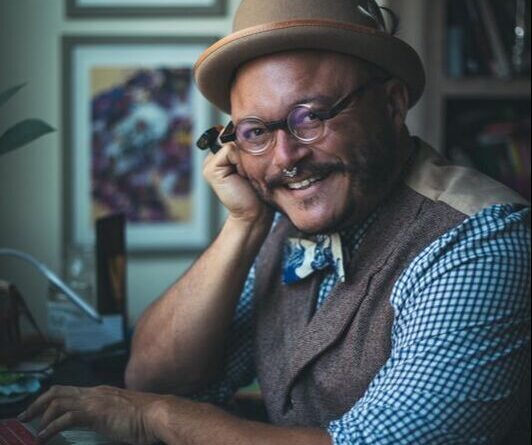Lambda Archives Announces Community Historian in Residence TJ Tallie
By TJ Tallie
Hi there/Sawubona! My name is T.J. Tallie (he/they), and I am Lambda’s Community Historian in residence here for the fall of 2024. As a Black queer historian, Lambda was an ideal place for me to spend time working with the incredible collections, and I’ve been honored and excited to be chosen to be part of the team. I’m honestly thrilled to serve as a Community Historian, a position that allows me to combine my skill set with my passions and my commitment to my community.
I am a professor of history at the University of San Diego, focusing on African history, colonialism, race, gender, and indigeneity. I have served as the director of the Africana Studies program at USD for the last three years, and work in telling larger Black histories while paying close attention to ideas of belonging and community. This year I am on a sabbatical at USD, which has allowed me time to work on creative and professional projects that I would not otherwise be able to pursue, and the good people at Lambda have become my second home as I undertake research.
While working with the Lambda staff this summer, we looked at potential projects that focused on Black stories while also being firmly rooted in local San Diego queer community. After a few weeks of research, poring through documents and really getting a feel for what life was like for Black queer folks in San Diego’s passed, I was able to find my broader topic. This project, titled “Whose World, Whose Home?’: Black Queer Life in San Diego, 1988-2002,” is an archival study of the lives of Black queer San Diegans in the late 1980s and 1990s, a time of profound change both for the city and in national attitudes towards race and sexuality. “Whose World, Whose Home” examines how Black queer San Diegans navigated, defined, and articulated the changing city around them. The project draws from the papers of Black gay and lesbian activists, Black queer newspaper editorials, first-person recollections from the period, and overall archives from the San Diego LGBT Community Center and San Diego Pride. Building on a body of Black and queer theoretical literature and “Whose World, Whose Home” is a deep-resourced archival project that seeks to foreground Black queer voices in a significant part of our local community’s history. The project will result in both a digital archive of resources freely available online, as well as an academic article telling more of the stories of Black queer San Diego.
I’ve been stunned at how much this project has impacted me so far. As a queer Black person from Southern California who’s spent about half of their life in San Diego, I am delighted and astounded to hear Black queer voices from the past, struggling with many of the same issues I have encountered. They make me feel seen, less alone, like I have a legacy that I’m following. I’ve been especially touched by the tireless writing of Black lesbian activist M. Corinne “Marti” Mackey (1950-92), who left behind a mountain of fearless and uncompromising writing denouncing racism, homophobia, sexism, and corporate greed in Hillcrest during her three years as a journalist, poet, and playwright in the city (1989-92). I would walk in each day, breathless, waiting to hear Marti’s words brilliantly and incisively pointing out the histories of exclusion, violence, and oppression. Marti called out so much that was wrong for Black queer San Diegans. But she also called us to live in community, to see things with hope and grace, and to call each other to live in dignity and care. That she died of cancer at 42 is a tragedy that I take personally. But her words hit me in my heart every day. They ask me to be better, and for us to make the world more meaningful, more beautiful, more worthwhile.
Honestly, working with the Lambda Archives has been a dream as a Black queer historian. It lets me use my passions and my skills to help build resources for our community. Truly, Lambda is an incredible, meaningful place; it’s more than documents and books, it’s a signpost to who we’ve been, and who we’d like to become.

